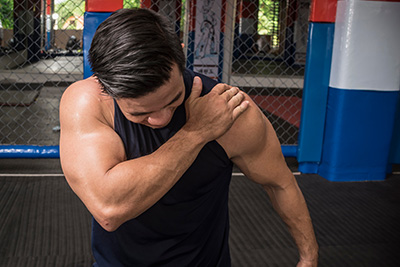
At the Center for Sports & Regenerative Orthopedics in Alexandria, VA, we can help you identify the cause of your Rotator Cuff pain and restore your daily function with an array of treatment options.
Contact us online or call (240) 754-7954 to schedule a consultation today with one of our Rotator Cuff specialists on King Street in Alexandria’s vibrant Old Town.
The Rotator Cuff connects your humerus to your shoulder blade and is essential in helping to lift and rotate your arm. Your arm is held in your shoulder socket by your Rotator Cuff. Your rotator cuff allows you to lift your arms and reach upward.
Damage to the Rotator Cuff can occur from a sudden injury or wear-and-tear damage over time. Rotator Cuff damage usually involves a torn tendon, so you often hear it referred to as a Rotator Cuff tear.
Most of these tears occur in people who are over 40 and are the result of a wearing down of the Rotator Cuff tendons that occurs slowly over time – degeneration that occurs due to weakness and mechanical imbalance. In most cases, this degenerative damage can be relatively painless. But not always.
The Rotator Cuff is made up of a group of four tendons that form a covering around the head of the humerus. When one or more of your four rotator cuff tendons is torn, the torn tendon can become partially or completely detached from the head of your humerus. Injuries of this type, especially when detachment occurs, can be extremely painful and debilitating.
In younger people, Rotator Cuff tears usually only occur from a major injury – from a fall for instance. When this happens, there is sudden intense pain. There may even be an audible snapping sensation followed by immediate weakness in the upper part of the arm affected.
In older people, however, repetitive movement and stress from athletic activities like rowing, weightlifting, tennis, can put you at risk for overuse tears. Work-related repetitive movement (carpenters, painters, etc.) and even routine chores or hobbies can also contribute – especially if overhead work is involved.
Sometimes lack of blood supply to the Rotator Cuff – which happens as you age – can eventually cause a degenerative tear.
How do you know if I have damaged your Rotator Cuff? Signs of a Rotator Cuff injury include:
We will perform a physical exam and a medical history, including questions about any activities that may have led to your condition. For a proper diagnosis, it is common to use x-rays or imaging tests like MRIs, or ultrasounds to assess tendon damage. Generally, ultrasound is our preferred imaging test for diagnosis and can detect tear fairly accurately.
At the Center for Sports & Regenerative Orthopedics in Alexandria, VA, we usually begin with the ultrasound exam and typically offer physical therapy and exercises to improve body mechanics as our first-line approach. We may also use Trigger point Injections or Dry Needling.
Dry needling and trigger point injections primarily function to stimulate circulation in the targeted areas and improve mobility. Increasing blood flow to the shoulder can help reduce the inflammation in the torn rotator cuff.
If these methods do not help, we may try other methods, like Platelet Rich Plasma (PRP). Research has shown that PRP is highly effective for treating rotator cuff tears, without the risk or expense of surgery.
Because we prioritize our patients’ preferences, we will employ the methods you prefer. Oftentimes, we see athletes who want the problem solved quickly, and we move right into the more in-depth techniques like PRP – aiming for fast results.
Other patients who prefer simpler or less-expensive methods and are in less of a hurry to fast-track treatment, can take treatment steps one at a time to see what works. All our treatment methods have an excellent track record and have brought impressive results for our patients in the Alexandria VA area.
For more questions about our array of treatment methods, speak with our experts today to see which might be the best treatment option for you. Call (240) 754-7954.
What would it be like to see increased function again and relieve debilitating pain and weakness from Rotator Cuff injury? Let our team of experts at the Center for Sports & Regenerative Orthopedics help you achieve your healing goals and put pain and weakness behind you – so you can reach for the sky again!
Call (240) 754-7954 or contact us online to set up a consultation with our Rotator Cuff specialists at our offices in Alexandria’s vibrant Old Town!
Center for Sports and Regenerative Orthopedics
1737 King Street, Suite 110
Alexandria, VA 22314
Phone:
(240) 754-7954
Get Directions